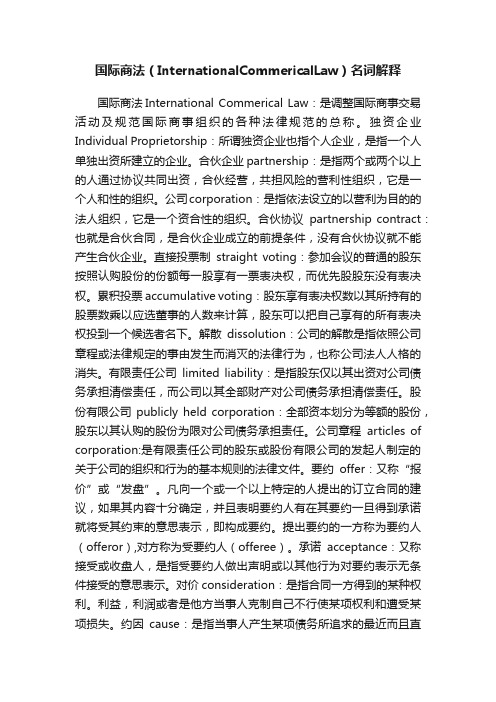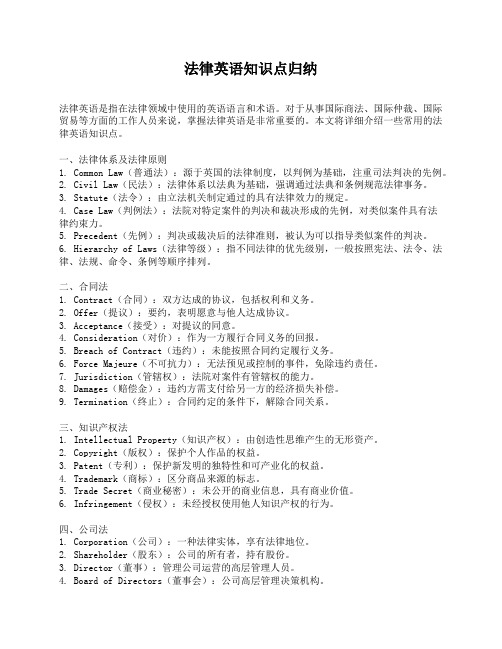国际商法5 Breach of Contract
国际商法(InternationalCommericalLaw)名词解释

国际商法(InternationalCommericalLaw)名词解释国际商法International Commerical Law:是调整国际商事交易活动及规范国际商事组织的各种法律规范的总称。
独资企业Individual Proprietorship:所谓独资企业也指个人企业,是指一个人单独出资所建立的企业。
合伙企业partnership:是指两个或两个以上的人通过协议共同出资,合伙经营,共担风险的营利性组织,它是一个人和性的组织。
公司corporation:是指依法设立的以营利为目的的法人组织,它是一个资合性的组织。
合伙协议partnership contract:也就是合伙合同,是合伙企业成立的前提条件,没有合伙协议就不能产生合伙企业。
直接投票制straight voting:参加会议的普通的股东按照认购股份的份额每一股享有一票表决权,而优先股股东没有表决权。
累积投票accumulative voting:股东享有表决权数以其所持有的股票数乘以应选董事的人数来计算,股东可以把自己享有的所有表决权投到一个候选者名下。
解散dissolution:公司的解散是指依照公司章程或法律规定的事由发生而消灭的法律行为,也称公司法人人格的消失。
有限责任公司limited liability:是指股东仅以其出资对公司债务承担清偿责任,而公司以其全部财产对公司债务承担清偿责任。
股份有限公司publicly held corporation:全部资本划分为等额的股份,股东以其认购的股份为限对公司债务承担责任。
公司章程articles of corporation:是有限责任公司的股东或股份有限公司的发起人制定的关于公司的组织和行为的基本规则的法律文件。
要约offer:又称“报价”或“发盘”。
凡向一个或一个以上特定的人提出的订立合同的建议,如果其内容十分确定,并且表明要约人有在其要约一旦得到承诺就将受其约束的意思表示,即构成要约。
法律英语知识点归纳

法律英语知识点归纳法律英语是指在法律领域中使用的英语语言和术语。
对于从事国际商法、国际仲裁、国际贸易等方面的工作人员来说,掌握法律英语是非常重要的。
本文将详细介绍一些常用的法律英语知识点。
一、法律体系及法律原则1. Common Law(普通法):源于英国的法律制度,以判例为基础,注重司法判决的先例。
2. Civil Law(民法):法律体系以法典为基础,强调通过法典和条例规范法律事务。
3. Statute(法令):由立法机关制定通过的具有法律效力的规定。
4. Case Law(判例法):法院对特定案件的判决和裁决形成的先例,对类似案件具有法律约束力。
5. Precedent(先例):判决或裁决后的法律准则,被认为可以指导类似案件的判决。
6. Hierarchy of Laws(法律等级):指不同法律的优先级别,一般按照宪法、法令、法律、法规、命令、条例等顺序排列。
二、合同法1. Contract(合同):双方达成的协议,包括权利和义务。
2. Offer(提议):要约,表明愿意与他人达成协议。
3. Acceptance(接受):对提议的同意。
4. Consideration(对价):作为一方履行合同义务的回报。
5. Breach of Contract(违约):未能按照合同约定履行义务。
6. Force Majeure(不可抗力):无法预见或控制的事件,免除违约责任。
7. Jurisdiction(管辖权):法院对案件有管辖权的能力。
8. Damages(赔偿金):违约方需支付给另一方的经济损失补偿。
9. Termination(终止):合同约定的条件下,解除合同关系。
三、知识产权法1. Intellectual Property(知识产权):由创造性思维产生的无形资产。
2. Copyright(版权):保护个人作品的权益。
3. Patent(专利):保护新发明的独特性和可产业化的权益。
4. Trademark(商标):区分商品来源的标志。
国际商法合同法英文版

The applicability of the CISG
Three conditions for CISG to apply: a. The contract is for the commercial sale of goods. (so sale of service contract excluded.) b. It is between parties whose places of business are in different countries. ( not nationality or citizenship) c. The place of business are located in countries that have ratified the convention.
Sales excluded from CISG
1. Consumer goods sold for personal, family or household use. 2. Goods bought at auction. 3. Stocks, securities, negotiable instruments or money. 4. Ships, vessels, or aircraft. 5. Electricity. 6. Assembly contracts for the supply of goods to be manufactured or
c. case law v. statuary law (ases and Criminal cases (民事案件
与刑事案件)
Civil cases may include suits for breach of contract (违约)or tort (侵权) cases, such as suits for personal injuries. Typically, they involve a request for damages of the wrongdoer. Criminal cases involve a representative of government attempting to prove the wrong committed against society and seeking to have the wrongdoer punished by the court system.
2-4国际商事合同法-违约责任及救济

• (3)不可归责于任何一方引起的给付不能。 • 根据《德国民法典》第323条的规定,合同 双方当事人因不可归责于双方当事人的事 由,致使自己不能履行应履行的给付者, 双方均可以免除其义务。
• 所谓给付延迟,是指债务已届履行期,而 且是可能履行的,但是债务人没有按期履 行其合同的义务。 • 这里同样要区别两种不同的情况: • 一种情况是债务人没有过失的给付延迟; • 另一种情况是债务人有过失的给付延迟。
• 对于债权人选择拒绝预期违约的限制,来 源于1961年White&Carter( Councils)诉 McGrego的判例。
案例阅读
• White & Carter( Councils) v. McGrego(1961)
• 美国《统一商法典》对债权人拒绝承认预 期违约的选择权也施以相应的限制。以避 免和防止债权人任意坚持合同效力而滥用 预期违约的救济权。 • 其第2-610条规定:“合同任何一方在履约 义务尚未到期时拒绝履行合同,如果造成 的损失严重损害了合同对另一方的价值, 受损方可以:
• 中国法中虽然有催告的概念,但并非如大 陆法系国家那样将催告作为追究违约方承 担延迟履约责任的前提条件。 • 不过,在某些时候,催告仍作为采取违约 救济时必不可少的程序,比如《合同法》 第94条规定了合同当事人的单方解除权, 该条规定“当事人一方延迟履行主要债务 ,经催告在合理期限内仍未履行的”,对 方即可享有合同解除权。
国 际 商 法
• 邹岿
• 安徽大学经济学院国际经济与贸易系教师 • 北京盈科(合肥)律师事务所高级律师
• 国际贸易学和法学双硕士
• 电邮:1055565394@
第二章 国际商事合同法
• • • • 第四节 违约责任及救济 一、违约责任的概念 1.概念及特点 违约责任( Breach of Contract),是指合同 成立后,合同当事人由于某种原因不履行 或者不完全履行合同义务,而应该承担的 民事责任。
国际商法第五章

II. Formation of Contract for International Sale of Goods
1. Formality of Contract 2. Offer (1) Definiteness Under Article 14 (1) of CISG, “(a) proposal for concluding a contract addressed to one or more specific persons constitutes an offer if it is sufficiently definite and indicates the intention of the offeror to be bound in case of acceptance. A proposal is sufficiently definite if it indicates the goods and expressly or implicitly fixes or makes provision for determining the quantity and the price”.
Key Terms
Remedy: 救济措施 Opt in: 决定参加 Opt out: 退出 Reservation: 保留 Avoidance of the contract: 撤销或废止合 同 Rescind: 废止一条法律或规章制度 Installment contract: 分期分批交货合同
Second, the CISG specifically excludes certain specific kinds of sales such as sale by auction, and certain specific kinds of goods, such as stocks, electricity, ships, hovercraft, and aircraft. Third, the CISG excludes sales of goods where the buyer supplies a “substantial part” of the “materials” necessary for production. Fourth, sales of manufactured goods are excluded where the “preponderant part” of the obligations of the supplier are in the form of labor or other servplication. According to Article (1) (b), Even if one or both parties do not have their place of business in a contracting state, the CISG might still apply “when the rules of private international law lead to the application of the law of a contracting state”.
《国际商法》第五章__国际货物运输法

(2)承运人的义务-管货
• 《海牙规则》第3条第二款: – 承运人应适当和谨慎地装载、搬运、配载、 运送、保管、照料和卸载所运货物。 – 《海商法》第48条:承运人应当妥善地、 谨慎地装载、搬移、积载、运输、保管、 照料和卸载所运货物。
34
案例
A公司委托B公司所属的“新生轮”运输 6000箱冻鸡,经过月余航行,到达上海港卸 货后发现全部冻鸡结冻变质,造成损失 132000美元。B公司称货物装船前冷藏舱设 备已由当地船检局检查,整个航程中机器正 常,温度为负12-17度之间。货损原因是由 于冷却器冻塞,冷气打不进冷藏舱所致。并 主张管船过失免责。 • 问题 – 承运人是否应承担赔偿责任? 35 – 提示:管船和管货
• •
11
海牙规则
(1)承运人的最低责任和义务,适航和管 货义务; (2)承运人的不完全过失责任原则 ( 3 )承运人赔偿限额为每件或每单位 100英镑或相当于100英镑的等值货币
12
维斯比规则
• 《维斯比规则》是对《海牙规则》的 修改和补充,在单位赔偿限额、提单的证 据效力、侵权行为之诉、承运人的受雇人 或代理人的法律地位、诉讼时效以及适用 范围等方面作了重要修订,但并未改变 《海牙规则》的基本内容。
24
当抵达科伦坡港卸完货后,收货人以脏包 造成其损失为理由,向斯里兰卡高等法院 申请扣船并提起诉讼,船被扣达13天。 经与收货人多次交涉,终于达成由我公司 赔付162 366.67美元而收货人撤回起诉 的协议。后原告以被告出具的保函为依据, 起诉被告。 问题:(1)该保函是否具有法律效力? (2)该保函能否对抗收货人,为什么?
25
四、提单当事人的责任制度 • • • • (一)承运人的责任制度 1、承运人的基本义务 克尽职责,使船舶适航 妥善而谨慎地装载、搬运、积载、运输、 保管、照料和卸载所运货物 • 禁止不合理绕航 • 合理速遣 • 货交收货人
国际贸易法Chapter25RemediesforBreachofContract
5. How to Calculate?
(1) Liquidated damages by agreement约定违约金 (2) Liquidated Damages by Law法定违约金 ① Where the contract is avoided (A) When the goods are Resold or Purchase other goods as replacements (B) When No Resold or Replacement Purchase ② Where the contract is not avoided
★ CISG Article 74: Damages for breach of contract by one party consist of a sum equal to the loss, including loss of profit, suffered by the other party as a consequence of the breach.
5.3 Breaches and Remedies
1. Principles of Remedies 2. Specific Remedies
1. Principles of Remedies
• Remedy the actual loss • Remedy the property loss • Remedy’s Relativity补救的相对性
1. Continental Law
• Failure to perform不履行 • Failure to perform fully as contracted不完
全履行
• Delay performance履行迟延 • Anticipatory breach预期违约
国际商法 合同法 合同的履行Unit5PerformanceoftheContract
Obligations of the buyer under CISG
The buyer’s obligation to take delivery consists: (1) in doing all the acts which could reasonably be
expected of him in order to enable the seller to make delivery; and (2) in taking over the goods.
同时履行抗辩权:是指双务合同的当事人一方,在 对方未对待给付之前或者履行不适当时,有权拒绝自 己的履行。
适用条件:
(1) 须由同一双务合同互负债务
(2) 须双方互负的债务均已届清偿期
(3) 须对方未履行或未适当履行债务
案情简介:甲与乙在2005年3月份签订一份合同,双方 约定甲应于同年5月份向乙交付10台冰箱,乙应同时向 甲交付价值5万元的制冷机。后来甲企业转产不从事冰 箱行业,但由于过去业务上的来往欠丙借款5万元。于 是与商场丙达成合意,由丙来接受乙交付的制冷机。 甲丙达成协议后,甲就此事通知了乙,乙表示到时会 将制冷机交给丙企业。同年5月份,乙已准备好应该交 付给丙的制冷机,但甲却于此时未向乙提供冰箱。乙 于是对丙表示,除非甲对其履行,否则他为避免风险 不会对丙履行。丙此时才知道甲乙之间的关系,表示 这与他无关,双方发生争议。在受到乙的抗辩后,丙 找到甲向其要求要么马上向乙履行,要么返还欠款。 甲不同意,主张合同已签订,不能反悔,只说尽快履 行其对乙的债务。
Rejection to perform by the party required to perform later 后履行抗辩权
Where the parties owe performance toward each other and there is an order of performance, prior to performance by the party required to perform first, the party who is to perform subsequently is entitled to reject its requirement for performance.
国际商法复习思考题
Review question for chapter oneI.Judge whether the following statements are true or false.1. At present, there is no uniform code on international business so national business law ofsome countries will be used to regulate international business relationship and deal with some international business disputes. ( )2. The French Civil Code of 1804 and the German Civil Code of 1896 are now regarded asthe very basis of the modern common law. ( )3. The Civil Law System is the legal system of England and countries that were once EnglishColonies. It is based on court-made rules or precedents. ( )4. Anglo-American Law System is derived from Roman and Germanic practice and set out innational codes. ( )II.Give brief definitions of the following terms.1.international business law2.international trade customs and usagesmon law4.civil lawIII.p ut the following terms into English1.大陆法系2.英美法系3.法的渊源4.国法大全5.法国民法典6.德国民法典IV.Answer the following question.1.What are the sources of International Business Law?Review questions for chapter twoI.Judge whether the following statements are true or false.1.To be legally sufficient, consideration must involve a legal detriment to the promise----- doing (or refraining from doing) something that one had no prior legal duty to do(or refrain from doing) or a legal benefit to the promsior 。
国际商法之合同法
香港公民甲将其名下一块地产以低价卖出,并从卖 款中拿出5000港币购买一套西装。其母作为监护人 要求当地法院认定甲所签转让地产和购买西装的合 同无效,并请求返还购买西装的款项。
香港法规定,18岁的公民为成年人;未成年人 无订约能力,但必需品合同除外。转让地产的合同 无效。甲母返还地产的请求应得到支持,西服属必 需品,购买西服的行为有效,甲母要求西服退货的 请求法院不会支持。
.
3、胁迫。西洋船舶公司诉海威汀造船厂案:被 告(海威汀造船厂)同意按固定价为原告(西洋船 舶公司)建造一艘船舶。在交付前被告要求加付 10%的款项,鉴于自己急需船舶,原告被迫同意加 价。船舶交付后,原告继续付款直至加付10%的款 项。原告以威胁为由向法院提出撤销加价承诺,要 求被告退还多收的价款。
.
住房所属的建筑物的任何其他人所受到的任何伤害 承担责任。”该案的判决表明:在一个居住用房租 约中加入的在因房屋及辅助施放的维修或管理不善 而造成的房客人身伤害的情况下免除房主责任的条 款是无效的,因为该条款与判例法的原则所体现的 公共政策相抵触。
犯罪协议,如谋杀、抢劫、暴行、斗殴和欺诈、 诬陷、侵占是非法协议。赌博、放高利贷、对敌贸 易等合同是违反法律的强制性规定的。
威伯尔诉诺斯瑞特案。原告威伯尔持有一张被告 开立的以原告为收款人的本票,但被告诺斯瑞特拒 绝向原告付款。理由是他开立该本票时受到了欺诈。 被告与其妻弟共同经营一家五金店,其妻弟在让他 签字时告诉他这是一份贷款申请,被告未查看内容 就签了字。其妻弟把转让该本票的所得花掉了,本 票到了原告之手。当他要求被告付款时,被告以欺 诈为由主张本票无效。
.
公平的一个考虑因素,而应同时考虑当事人在签订 合同时是否作了有意义的选择。本司法管辖区从未 确定过单纯以价格过高为理由主张显失公平的辩护。 因此,初审法院和上诉均法院均判定帕特森太太败 诉。
- 1、下载文档前请自行甄别文档内容的完整性,平台不提供额外的编辑、内容补充、找答案等附加服务。
- 2、"仅部分预览"的文档,不可在线预览部分如存在完整性等问题,可反馈申请退款(可完整预览的文档不适用该条件!)。
- 3、如文档侵犯您的权益,请联系客服反馈,我们会尽快为您处理(人工客服工作时间:9:00-18:30)。
Effect of Nonmaterial Breach
By contrast, when the breach is not serious enough to be material, the nonbreaching party may sue for only those damages caused by the particular breach. In addition, he does not have the right to cancel the contract, although a nonmaterial breach can give him the right to suspend his performance until the breach is remedied. Once the breach is remedied, the nonbreaching party must go ahead and render his performance, minus any damages caused by the breach.
Specific performance under CISG
A court may grant specific performance only if all of the following conditions are met: (1) the buyer had not resorted to another remedy, such as avoidance or price reduction; (2) the seller had failed to deliver, or in the case of nonconforming goods, the nonconformity was so serious that it constituted a fundamental breach; (3) the buyer gave timely notice to the seller that the goods were nonconforming; (4) the buyer had made a timely request that the seller provide substituteperform
In the event that the seller has failed to deliver the goods, and the time for their shipment or delivery has passed, the buyer may grant the seller extra time to do so. During this time, the buyer may not avoid the contract or resort to a breach of contract action.
Avoidance of contract
In the case of a dispute under CISG, one party can avoid the contract only in the case of a fundamental breach by the other party.
Money damages
The method of measuring money damages depends on whether the buyer has been able to purchase substitute goods from another supplier. If the buyer does purchase substitute goods, the buyer may claim damages if the substitute goods cost more than the contract price. If the buyer has not purchased substitute goods, damages are measured by the difference between the contract price and the current market price.
Unit 5 Breach of the Contract
When a person’s performance is due, any failure to perform that is not excused is a breach of contract. Not all breaches of contract are of equal seriousness, however. Some are relatively minor deviations, whereas others are so extreme that they deprive the promisee of the essence of what he bargained for. The legal consequences of a given breach depend on the extent of the breach.
Legal Remedies ( Damages ) - Limitation on recovery of Damages in contract Cases
1 a party can recover damages only for those losses that he can prove with reasonable certainty. 2 A breaching party is responsible for paying only those losses that were foreseeable to him at the time of contracting. 3 Plaintiffs injured by a breach of contract have the duty to mitigate ( avoid or minimize ) damages.
Remedies under CISG
The remedies under CISG are drawn from both common law and civil system (1) avoidance of the contract; (2) seller’s right to remedy or cure; (3) seller’s additional time to perform (4) price reduction (5) money damages (6) specific performance
Effect of Material Breach
A material breach occurs when the promisor’s performance fails to reach the level of performance that the promisee is justified in expecting under the circumstances. The party who is injured by a material breach has the right to withhold his own performance. He is discharged from further obligations under the contract and may cancel it. He also has the right to sue for damages for total breach of contract.
Classification of Contract Breach
1. Non-performance Non(1)Subjective non-performance不愿履行 non-performance不愿履行 (2)Objective non-performance履行不能 non-performance履行不能 2. Late performance 3. Partial performance 4. Defective performance 5. Anticipatory Breach and Actual Breach 6. Material Breach and nonmaterial Breach
Seller’s right to remedy
A seller who has delivered some goods to the buyer prior to the delivery date, even if the goods are nonconforming or the shipment is not complete, has the chance to remedy the problem in the shipment, until the time for performance expires.
Anticipatory Repudiation
One type of breach of contract occurs when the promisor indicates before the time for his performance that he is unwilling or unable to carry out the contract. This is called anticipatory repudiation or anticipatory breach. Anticipatory breach generally constitutes a material breach of contract that discharges the promisee from all further obligation under the contract.
